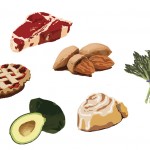Fats And Carbs: Why The Bad Rap?

By Emily Wickwire and Chelsea Renter
Greasy cheeseburgers. Ice cream. Pizza. We all know carbs and fats have a bad reputation. But the truth is both nutrients are essential to proper health. Before you nix the toast with your eggs, make sure you are aware of the difference between nutrient-dense, healthy fats and carbohydrates and those that really do sabotage your diet.
The Bad Fats
Saturated Fats
Mostly found in animal and dairy
products, these fats do not provide
significant health benefits. In fact, eating a lot of saturated fat over time causes cholesterol levels
to rise, leading to heart attack or stroke. It's best to limit your intake of fatty cuts of meat like beef and lamb, cheese, whole milk, as well as most junk food — think ice cream, baked goods and anything fried.
Trans Fats
Much like saturated fats, trans fats are unhealthy and raise your body's levels of LDL (low-density lipoprotein), or "bad" cholesterol. But even worse, they also diminish your supply of healthy cholesterol, or HDL (high-density lipoprotein). Try to keep trans fats to less than one percent of your daily calorie consumption. Shy away from fried foods, baked goods, frozen dinners and foods that contain hydrogenated oils.
The Good Fats
Monounsaturated Fats
When eaten in moderation, these fats can be a beneficial part of your diet.
Besides providing important nutrients like vitamin E, they can lower cholesterol levels and reduce health risks such as heart attack and stroke. Foods like avocados, nuts and peanut butter boast these healthy fats, as do a number of vegetable oils — among them olive oil, peanut oil and canola oil.
Polyunsaturated Fats
Besides having the same cholesterol-lowering qualities as monounsaturated fats, polyunsaturated fats provide omega-6 and omega-3 fats, which are important for brain function and bodily growth. However, foods containing these good fats are caloric and shouldn't be eaten in excess. For sources of this type of fat, try fish like salmon and trout, and seeds and nuts like flax and almonds.
The Bad Carbs
Simple Carbohydrates
Simple carbohydrates (think: candy and table sugar) are fast-digesting, causing glucose and insulin levels to spike rapidly. Because these simple carbs can be broken down so fast, they quickly fill our muscles' energy stores, and any
remaining glucose is stored as fat. Ditch the processed, refined carbohydrates found in white bread and sugary beverages.
The Good Carbs
Complex Carbohydrates
Unlike simple carbs, the body digests complex carbohydrates slowly, keeping you fuller longer and maintaining optimal energy levels. To reap these health benefits, embrace the complex, nutrient-rich carbohydrates found in barley, whole grains, fruits, beans and vegetables.
The post Fats and Carbs: Why the Bad Rap? originally appeared on Spoon University. Please visit Spoon University to see more posts like this one.